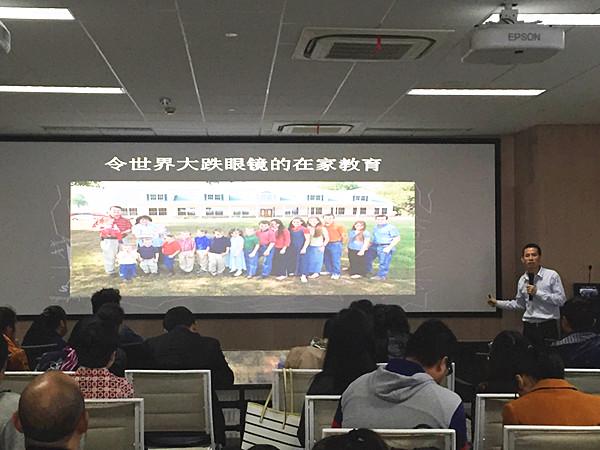Homeschooling started in the United States in the 19th century, and it flourished in the 1950s. However, in China Homeschooling has only recently begun. It is still an educational experiment full of unknowns. It is a product of individualistic education, and an important reform in the path of education.
Why homeschooling? How can it benefit children any differently from formal schools? At the seminar for a Homeschool Workshop in Hangzhou, the keynote speaker used a picture to address the topic "Parents questioning if homeschooled children will be unsociable and eccentric." He said, "Today, we spend a lot of time thinking how pitiful it is our children don't have playmates. In the picture, the child who pastures cattle is fused with heaven and earth. He doesn't have many playmates, so what does he do? He communicates with plants, flowers, and animals. " Children are perceptive about life, and this is what the schools lack. Parents should look at problems with different views.
"Children have their own timetable and patterns in development." Teacher Xu quoted from Eccl. 3:1, "There is a time for everything, and a season for every activity under heaven." (NIV) He said, "God has His own timetable for the development of children."
God Has Prepared Timetable for the Development of Children
Xu mentioned that humans have three natures:
A, Individual Nature
1. Independent personality is the guarantee of the sense of security and the satisfaction of emotions. People learn rules and boundaries in family relations. "It's also important for children to build a sense of personal security."
2. The development of one's body, mind, and spirit needs its own independent time and space. "The body, mind, and spirit need to interact with the world independently, so that the senses can develop at a higher speed."
3. Trainings of habits, morals, and willpower. "This takes a longer time to train."
B, Family Nature
As the nature of family members, they need to train the children in families on how to deal with family lives, family relationship experience, and abilities to deal with relevant issues.
C, Social Nature
As the nature of social members, this is the ability to deal with social life, interpersonal relationship experience, and other relevant issues. The three natures help children grow from their families to a wider world, and this gradual process fits their growth.
Each nature has its own scheduled development. Children from 0-6 are at the individual development stage, from 7-12 are the family nature development stage, and from 13-18 are the social nature development stage. Within these three stages, from 0-6 is particularly important.
Xu said that a child from 0-6 focuses on his own needs. As he grows older, his horizon widens more and more, first from the family and then to other people. With more time, his horizon widens more towards society. Therefore, the development of children's social abilities is in accordance with this nature. "At first, a child can only deal with easy, stable and deep interpersonal relationships, but he can't deal with complicated, unstable and shallow relationships. As the child grows older he can deal with these complicated and shallow relationships gradually."
However, in kindergartens and schools, relationships are unstable and complicated. Xu gave some examples of this. The relationship with teachers is not stable, because the teachers may change between semesters. The relationship with classmates is also shallow because classmates may also change between semesters. "At first our child couldn't deal with these relationships. He didn't know what kind of relationship it is with the teacher." Xu emphasized that "children at 0-6, they need a stable sense of security and satisfaction of their emotions, and they all come from the deep and stable relationships with their parents. They learn basic rules and boundaries in the relationships with parents." Such children, when they have their own space, will have good development. And while dealing with relations with their parents, their morals and habits are well exercised.
Xu mentioned that today there are many parents who urgently send their very young children to kindergartens. Some parents do so because of work, while some think "children are social animals, so they need to engage with the society early." "If that's the case, why not just send the child to kindergarten when it's born?" Xu asked humorously. Then he said, "On one hand, with sending two to three-year-olds to kindergarten, they have no sense of security and they get anxious. On the other hand, since the children there haven't built their basic interpersonal rules and boundaries, nor developed any themselves, they fight for toys with each other in kindergarten. " "It is rather difficult to discipline them when they're not fully developed."
The Danger of Children Entering Group Life Too Early
Peer Pressure:
Xu mentioned campus bullying, and that it actually happens in kindergarten. Some kids with greater strength would push other kids. But there are too few teachers to attend to all the kids. Therefore, it is difficult for children to enter group life when they're not ready.
Puppy Love:
"It will only be a few days after the children start school that they know a lot. They will laugh at their parents for not knowing." Xu said, "Children want to play with older ones. They want to grow up and be more mature. Also in that group whoever is more mature gets more say." When the child suffers stress and harm at school, and does not get prompt ease and care from parents at home, their stress increases bit by bit until it either acts out or is destroyed.
The ancient Greeks believed that men are social animals. However, in Hebrew culture men are made by God, and individuals come before groups. The healthy social ability of children starts with independent personalities; it also ends with the same. Therefore, one of the most important educational goals is to establish the independent personalities of children.









